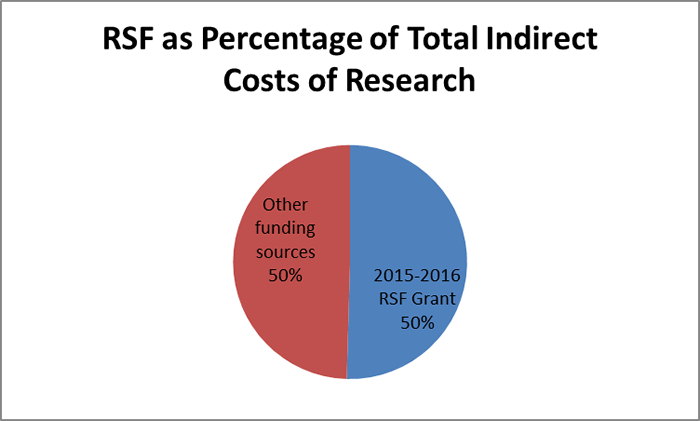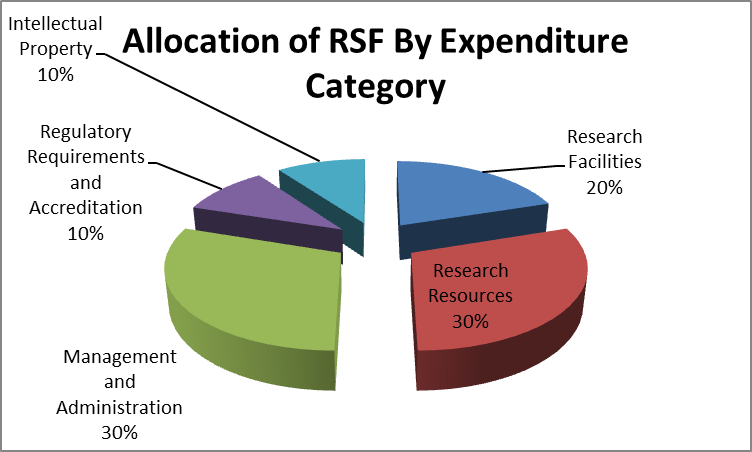Research Support Fund: Accountability and Public Acknowledgement 2016 - 17
Definition
While individual research awards can be used to cover the direct costs of research, such as certain salaries, equipment, and supplies connected with a project, research institutions must bear the increasingly high costs of supporting their overall research activity with appropriate facilities, academic research resources, researcher salaries, management and administrative personnel, oversight of regulatory compliance and accreditation, and intellectual property management.
The University of Winnipeg has been very grateful for the Research Support Fund grant. In the past year, the grant money was used in several areas that supported the ongoing research work at our facilities. Some examples include:
Maintaining Qualtrics Software Institutional License: Qualtrics is web-based, research survey software that offers many advanced, but user-friendly, features. Qualtrics enables users to do surveys, get feedback, and conduct polls using a variety of distribution means. Qualtrics is cloud-based software and has proven to be a versatile resource for our researchers.
Vivarium: The University of Winnipeg Vivarium occupies a 7500 square foot space for keeping and raising animals for research. The complex houses an Aquatic skid, three fish housing systems, and one living stream. Rodent equipment includes a Cage Washer with access to a clean and dirty side, ventilated lab bench, change station, operating room, and both mouse and rat housing systems. The animals are monitored every day by the technicians (weekends and holidays as well). The research ranges from nutritional studies to monitoring for viral infection (bat facility) to digital imaging.
Library: Due to the rising cost of academic journals, the Library has focused on sustaining resources responsibly through assessment and increased dialogue with faculty about their needs in the short and long term. This past year the Library continued to seek opportunities to shift some acquisition expenditures to supporting Open Access initiatives like Erudit and Scoap3. These investments benefit the UW community by promoting trustworthy and respected open access resources to our faculty and students, and also in defining an institutional role in the shifts in scholarly communication occurring in the global academic landscape.
Financial Services Upgrades: During the past fiscal year, the University began its transition to a new financial system, Microsoft Dynamics NAV and new reporting software, Prophix. Award functionality will include multi-year reporting with enhanced non-financial information attached. Over the next year, training sessions, enhanced researcher access, and other “go live” stages will bring about faster, more accurate, and more efficient services for researchers and research administration staff.
Research Support: A full time Program Officer position was added to the University of Winnipeg Research Office to maintain and develop research partnerships and facilitate knowledge mobilization and potential commercialization of research. As the University’s research funding in the past decade has nearly tripled, the University of Winnipeg is striving to build support for researchers.
About the Research Support Fund Program (RSF)
In 2003 the Federal Government introduced the Indirect Costs of Research Program (ICP) to provide grants to Canadian universities and colleges to offset the financial challenges of administering Tri-Agency funded research. The Research Support Fund replaced the Indirect Costs Program as of May 25, 2015. The program is part of the federal government’s strategy to make Canada one of the world’s top countries in research and development. It currently has a budget of $342 million and serves 126 postsecondary institutions across the country. The Government of Canada recently announced an additional $9 million in Budget 2015 and $19 million in Budget 2016 to support the RSF. These additional funds will be allocated to eligible institutions in fall 2016.
The Research Support Fund assists Canadian postsecondary institutions and their affiliated research hospitals and institutes with the expenses associated with managing the research funded by the three federal research granting agencies:
- the Canadian Institutes of Health Research (CIHR);
- the Natural Sciences and Engineering Research Council (NSERC); and
- the Social Sciences and Humanities Research Council (SSHRC).
Every year, the federal government invests in research excellence in the areas of health sciences, engineering, natural sciences, social sciences, and humanities through its three granting agencies. The Research Support Fund reinforces this research investment by helping institutions ensure that their federally funded research projects are conducted in world-class facilities with the best equipment and administrative support available.
Eligible institutions receive an annual grant through the fund to help pay for a portion of the central and departmental administrative costs related to federally funded research.
What costs does the program support?
Examples of costs supported by the program are:
- salaries for staff or students who provide administrative support for researchers and their projects;
- training costs for workplace health and safety;
- costs related to the maintenance of libraries and laboratories; and
- Administrative costs associated with getting a patent for an invention.
RSF Grants at the University of Winnipeg
RSF grants are allocated annually, based on a rolling average of the Tri-Agency funding awarded to the institution over the previous three years. In 2015-2016 The University of Winnipeg incurred eligible costs of $1,926,256 in support of Tri-Agency funded research activities. The total RSF grant awarded for that year was $972,058, off-setting 50% of these eligible costs.

The program allows institutions flexibility to allocate their annual RSF grant, at their discretion, to offset eligible costs incurred under five categories:
- Research facilities: renovation & maintenance of research facilities, upgrades and maintenance of research equipment and other devices, operating costs, and technical support for labs, offices and other facilities.
- Research resources: acquisition of library holdings, improved information resources, library operating costs and administration, and insurance on research equipment and vehicles.
- Management and administration of the research enterprise: support for the completion of grant applications/research proposals, acquisition, maintenance and/or upgrade of information systems to track grant applications, certificates and awards, training of faculty and research personnel, human resources and payroll, financial and audit costs, research planning and promotion, and public relations.
- Regulatory requirements and accreditations: creation and support of regulatory bodies, relevant training of faculty and other research personnel, international accreditation costs, upgrades and maintenance of research facilities to meet regulatory requirements, technical support for animal care and handling of hazardous substances, and the purchase of animals exclusively for training purposes (not research).
- Intellectual property: creation, expansion or sustenance of a technology transfer office or similar function, administration of invention patent applications, support for technology licensing, administration of agreements and partnerships with industry, development of incubators, support for the creation of spin-off companies, certain public outreach activities, and marketing of teaching materials, scientific photo libraries, data sets, and other tools for knowledge transfer.

UNIVERSITY OF WINNIPEG 2016-2017 ALLOCATION OF RSF FUNDS
Outcomes Reports:
2015-2016 [PDF]
2014-2015 [PDF]
2013-2014 [PDF]
For more information about the program please visit the Research Support Fund’s website:
http://www.rsf-fsr.gc.ca/about-au_sujet/index-eng.aspx
